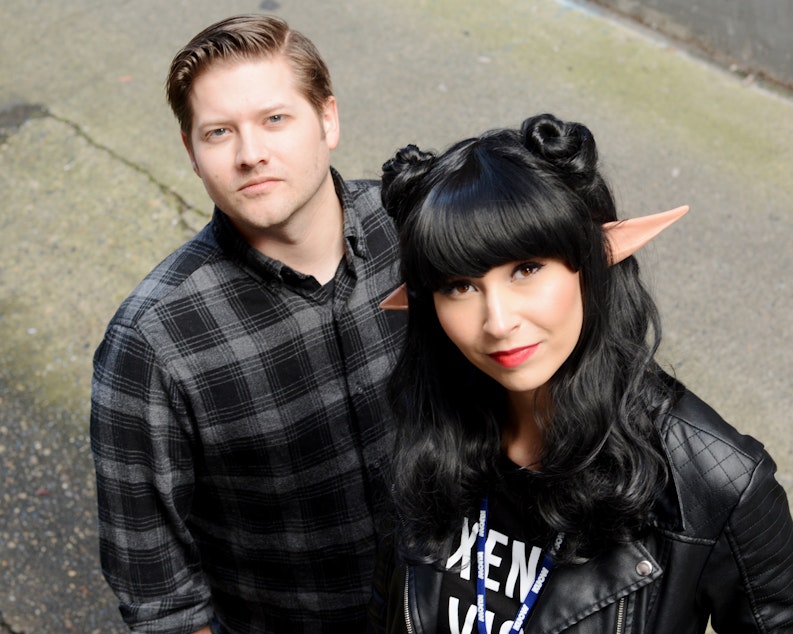Cosplay and comics: Why does Seattle love geek culture so much?

Bill Radke spoke with Dyer Oxley, co-host of the NW Nerd podcast, and TyTy, a Northwest cosplayer and the creator of Lead by Example Apparel, about what goes into the creation of costumes worn in cosplay.
Here are excerpts from their conversation earlier this month just before Emerald City Comic Con. Questions and responses have been edited for clarity and length.
When did you start making costumes?
TyTy:I started making costumes at a really young age. I think I was probably about four or five. My great-grandmother started making costumes and outfits for me, and I just kind of naturally loved it. And then as I got older, I started getting more into fantasy novels and wanted to start creating those characters. So, I did a lot of Hogwarts students outfits growing up … The work people put into their costumes are just incredible.
Dyer, you’re not dressed up. Why not?
Sponsored
Dyer: Well, it is a little bit intimidating. I know people that are very, very involved in this. And especially if you follow any cosplayer on Instagram or social media, you see the horror stories of con-crunch, they call it. It's the days before convention. And they are trying to get these costumes, and you're seeing burn marks. You're seeing stabbings from needles. So there's that terrifying factor for a hypochondriac like myself … Some of them are more involved, some of them would be my level that throws on a Superman shirt underneath my real shirt and then I just kind of walk around with that.
TyTy, do you think Dyer should give cosplay a try?
TyTy: I think everybody needs to give cosplay a try … It’s such a positive community, and it's open for anyone. That's what's amazing about cosplay, is that anyone can do it. You can be three years old, you can be 90 years old. My favorite is when I see families encouraging their kids to just cosplay — if it's store bought, if they made it over the weekend — I encourage everyone to do it.
If you weren't terrified, Dyer, what would you want to dress as?
Dyer: Off the top of my head it would probably something really ridiculous like Real American Hero or something like that from back in the day, and I would probably carry around that really annoying soundtrack, just so that you would know. But it would be something that nobody would know unless you were, maybe, 50 years old.
Sponsored
I hear TyTy saying you'd be loved and welcomed.
Dyer: Well, you would … Nobody looks at you snotty and so forth, like you do see that every now and then. I don't want to say they're shot down, but that's kind of frowned upon … Why bring that negativity into this space? Especially when these things happen at conventions. There's this vibe of, these are your people, you know? Like, I didn't really express my nerd for a while.
Why didn't you express your nerd?
Dyer: I used to be really cool. You can't tell right now. Long black hair, leather jackets, played in bands. And that environment wasn't really conducive to… you don't really talk about that kind of stuff. I tried talking about it with bandmates and so forth, and they wouldn't really be as into it. Walking to a place like this, you get into conversations about this comic book over this comic. You'd go to the Image Comics' book table and see what's new out there, maybe get into new stuff that you haven't been in before. And you don't really have those conversations unless you have a really good comic book shop in your neighborhood. Now, I live in Seattle, so I do.
TyTy, did you ever hide your nerdiness?
Sponsored
TyTy: Yeah, when I was, I think, in middle school, I went from going to Catholic school to a really bad public school, and I was teased like crazy … After that, I was like, I don't want to be ashamed. I don't want other kids to feel ashamed. And I've kind of always made an effort to never hide my geekness, and to be an influence to other kids — to love their fandoms and never feel ashamed of what they love and who they are.
But will you help me understand … why is there all this judgment?
Dyer: Why does everybody make fun of hipsters these days? When I look at a hipster, I just look at, OK, so that guy likes typewriters. So what? … I look at that and find it fascinating. But maybe we’re hardwired through all this evolution to find the one anomaly out there — and that's weird. You. That's other.
But these are very popular things. It's not like you're outsiders.
TyTy: There’s a new generation. They don't have to feel ashamed. They can be completely loved and embraced in this community and accepted for who they are. I think if anything, it's just awesome.
Sponsored
Does any part of you regret that geek culture has gone mainstream?
Dyer: The thing is, it's already been big here. There's something about the Northwest that has just always been home to the indoor kid. And all these indoor kids are now finding ways to get together. You know, we have the comic book shops when a lot of other areas in this country, they've gone downhill. Bookstores in general have been suffering. We've got a ton in Seattle right now — we’ve even got a nonprofit comic book shop. There's just a lot here for this. And so [Emerald City Comic Con] one time a year, I don't think that's overexposure. I just think that's the one time everybody can kind of get together.
Produced for the web by Amy Rolph.

